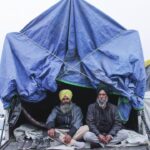Hundreds of suspected members of the ‘Ndrangheta, Italy’s most powerful mafia group, will face a judge this week as the country’s biggest “maxi-trial” of the past three decades gets underway.
The trial against the crime syndicate and its accomplices – among them politicians, civil servants, police and white-collar businessmen – is expected to last more than two years.
With 355 defendants, over 900 prosecution witnesses and 400 lawyers, the trial also features an unprecedented 58 state witnesses ready to break their code of silence, or omerta, and expose the clan’s long-buried secrets. Held inside a specially outfitted building in the heart of ‘Ndrangheta territory in Calabria, Italy’s poorest region, the trial beginning Wednesday targets just one group, the Mancuso family and its affiliates.
During a recent hearing, it took three hours to read the names of the defendants, which include boss Luigi Mancuso, “The Uncle” – who spent nearly 20 years in prison before going underground – and dozens of others with nicknames straight out of Hollywood, like “The Wolf,” “Fatty,” “Sweetie,” “Blondie,” “Little Goat,” and “The Wringer.”
The trial is a show of strength for the state in the backyard of the ‘Ndrangheta, which controls tons of cocaine flowing into Europe.
Taking to the court will be Italy’s most famous anti-mafia prosecutor, Nicola Gratteri, who has lived under police escort for more than 30 years.
As a child, the 62-year-old Calabrian played soccer with many of those he put behind bars decades later. He has vowed to take down “this asphyxiating ‘Ndrangheta, which truly takes the breath and the heartbeat from the people.”
The trial’s size is only eclipsed by Italy’s first “maxi-trial” of 1986-87 in Palermo against Sicily’s Cosa Nostra and its web of connected families.
That now-legendary event saw 338 people convicted. Prosecutors Giovanni Falcone and Paolo Borsellino were later assassinated by the mob.
The scope of the upcoming trial is more limited, targeting one of the estimated hundreds of ‘Ndrangheta families whose tentacles spread globally.
Still, it is significant not only for its size but also for the inclusion of so many lawyers, politicians, public administrators and entrepreneurs who help the ‘Ndrangheta operate, said Federico Varese, professor of criminology at Oxford University.
“It makes the point that there’s a society outside the criminal organization that’s colluding and helping,” he told AFP.
“Obviously it’s shocking that you have a criminal group so rooted in the territory you have to put hundreds of people on trial,” Varese said.
“This trial shows how deeply rooted the ‘Ndrangheta is in society.”
The number of accused swells to over 400 when including the more than 90 defendants who opted for speedy trials.
Among them is former parliamentarian Giancarlo Pittelli, a renowned defense lawyer, Freemason and ex-senator from former premier Silvio Berlusconi’s Forza Italia party. He denies accusations he acted as middleman between the ‘Ndrangheta and the world of politics, banking, and other powerful institutions, including the courts.
Most of the defendants were swept up in a series of orchestrated pre-dawn raids in December 2019, resulting in arrests throughout Italy and in Germany, Switzerland and Bulgaria.
A view taken on December 15, 2020 in Lamezia Terme, Calabria, shows Catanzaro’s public prosecutor, Nicola Gratteri (center), addressing reporters during a visit of a new bunker room (rear) built for the upcoming ‘Rinascita-Scott’ maxi-trial in which more than 350 alleged members of Calabria’s ‘Ndrangheta mafia group and their associates go on trial this week. Photo: AF


